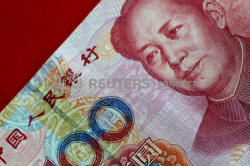Yuan slides to 11-year low as trade war rattles investor confidence
 Send a link to a friend
Send a link to a friend
 [August 26, 2019] By
Tommy Wilkes [August 26, 2019] By
Tommy Wilkes
LONDON (Reuters) - China's yuan fell to an
11-year low in the onshore market and a record low offshore on Monday
after the latest escalation in the U.S.-China trade war rattled investor
confidence.
President Donald Trump announced an additional 5% duty on $550 billion
in targeted Chinese goods on Friday, hours after Beijing unveiled
retaliatory tariffs on $75 billion worth of U.S. products, sending
stocks into a tailspin and investors rushing for the safety of bond
markets.
Trump on Monday sought to limit the fallout and smooth tensions, helping
the yuan come off its lows and the dollar recover against the Japanese
yen.
The U.S. president said China had contacted U.S. trade officials to say
they wanted to return to the negotiating table. Beijing called for calm.
In China's onshore market, the yuan <CNY=CFXS> fell to 7.1500 per
dollar, the lowest since February 2008.

In the offshore market, the yuan <CNH=EBS> slid to as low as 7.187 yuan,
the weakest since international trading in the currency began in 2010,
before recovering to 7.1524 yuan - down 0.2% on the day - after Trump's
upbeat comments.
In a sign that some calm had returned to markets, the Japanese yen -
which investors regard as a safe-haven - fell 0.5% to 105.86 <JPY=EBS>,
having earlier hit a new seven-month high of 104.46.
Commerzbank analysts said "market sentiment has been undoubtedly hit
hard as there is an even lower chance of a trade truce in the
foreseeable future."
They said China could let the yuan "depreciate further to ease the
tariff pains, and somehow weaponize the currency to anger Trump."
Although they added that China would be reluctant to allow any
uncontrollable currency depreciation given it would spur capital
outflows and a massive hit to investors confidence.
[to top of second column] |

A China yuan note is seen in this illustration photo May 31, 2017.
REUTERS/Thomas White/Illustration

Elsewhere, the dollar rebounded and was last up 0.3% against a basket of
currencies <.DXY>.
Versus the euro it rose 0.2% to $1.1117.
Writing before Trump's comments helped the dollar to rebound, Marshall Gittler,
a strategist at ACLS Global, noted that the greenback was not behaving as a
safe-haven currency.
"Today's move suggests that the market is beginning to wonder if Trump isn't
shooting himself and the US economy in the foot with his endless trade war," he
wrote.
The Turkish lira weakened more than 1% against the dollar on Monday after
briefly plunging to 6.47 in what market watchers described as a "flash crash" as
Japanese investors slashed their exposure to riskier assets.
The lira was last down 1% at 5.8181 <TRYTOM=D3>.
The Australian dollar <AUD=D3>, a liquid proxy for global risk sentiment,
earlier fell to $0.6690, within a whisker of a recent decade-low of $0.66775,
before recovering to $0.6766, up 0.2% on the day.
The New Zealand dollar <NZD=D3> slipped 0.2% to $0.6380 after earlier sliding to
a level not seen since 2015.

Sterling fell 0.3% to $1.2239 <GBP=D3> as investors waited for the next
developments in Britain's bid to get the European Union to renegotiate its
Brexit withdrawal agreement.
(Editing by Toby Chopra)
[© 2019 Thomson Reuters. All rights
reserved.] Copyright 2019 Reuters. All rights reserved. This material may not be published,
broadcast, rewritten or redistributed.
Thompson Reuters is solely responsible for this content. |